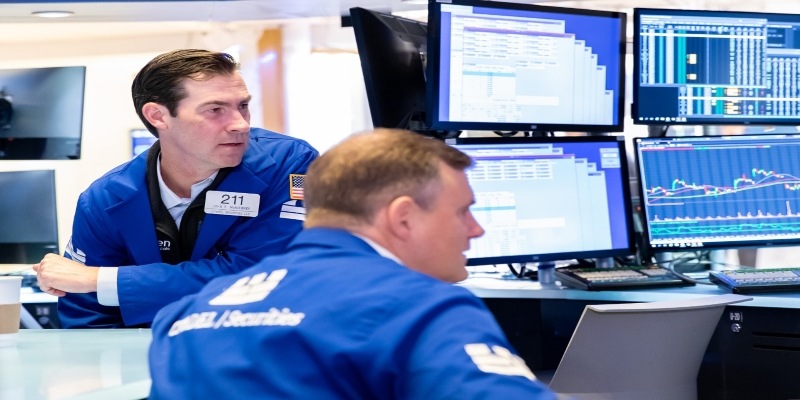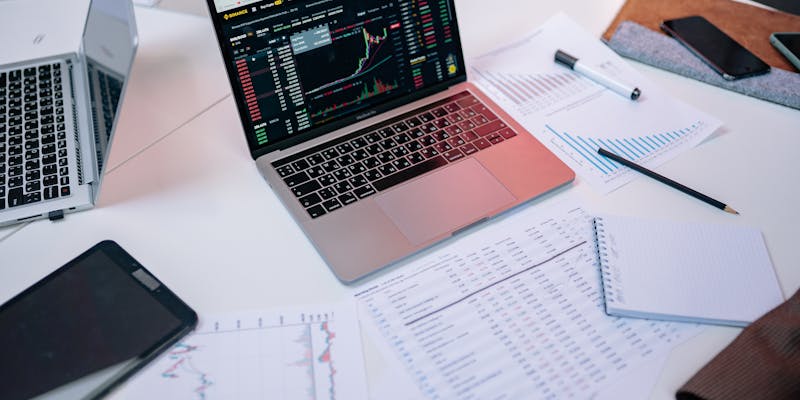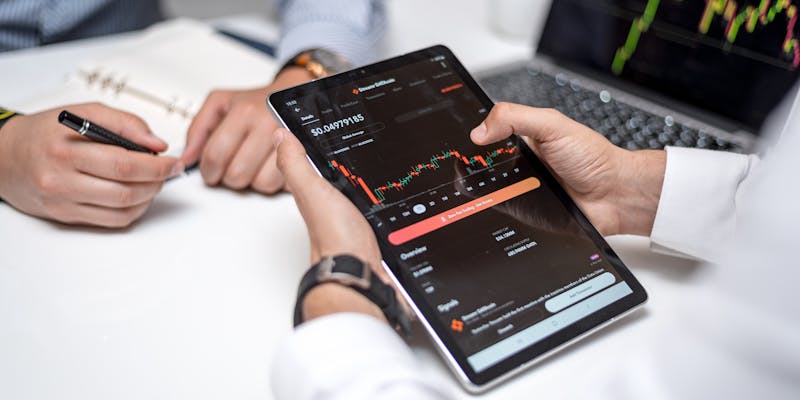The Role of a Designated Market Maker (DMM) on the NYSE and Its Difference from a Broker
Dec 01, 2024 By Georgia Vincent
It has come to be quite complex in the process of dealing with numerous responsibilities and varied natures of different roles and participants involved in the working of the stock exchanges. One of the most important roles has come to be that of the Designated Market Maker (DMM) on the New York Stock Exchange (NYSE). Differing from the brokers who will mainly be executing trades on behalf of clients, DMMs make a stabilizing presence and add liquidity and order to the trading process.

No matter if you are an investor who is curious about how trades are accomplished behind the scenes or you simply have an interest in the machinery of the stock exchange, you'll want to know more about what a DMM does. This article elaborates on the role of the DMM at the NYSE, explains how they differ from brokers, and explores why their existence is vital for a properly functioning market.
What is a Designated Market Maker (DMM)?
A Designated Market Maker, or DMM, is the professional or firm the NYSE designates to oversee trading in certain securities. They ensure that orders take place in an orderly and continuous fashion and provide adequate liquidity in the stock to which they have been assigned. Operating almost as the "host" of the trading floor in the stocks they are assigned, they step in whenever there are fluctuations to stabilize things.

The role of DMMs dates back to the very early days of the NYSE. Previously known as "specialists," their core duties remain focused on maintaining market stability, reducing volatility, and ensuring that trades are executed smoothly. In short, DMMs are here to keep things running so that dramatic swings in stock prices do not occur by trading on their own account in order to balance demand and supply.
The Responsibilities of a DMM on the NYSE
At its core, a DMM's role revolves around fostering liquidity and stability. In a highly dynamic market environment like the NYSE, this is no small feat. Here are some specific ways DMMs contribute to the marketplace:
Maintaining Liquidity
One of the DMM's primary responsibilities is ensuring theres always enough buy and sell volume in the stock market. They do this by actively buying and selling shares from their account, stepping in when buyer or seller activity is low. By doing so, they help keep trading consistent and smooth, which is crucial for preventing large price gaps and ensuring investors can trade when they need to.
Price Discovery and Stability
DMMs are instrumental in establishing the opening and closing prices for stocks. They do this by observing market demand, matching orders, and ensuring trades align with broader supply and demand trends. By monitoring price changes throughout the day, DMMs help reduce volatility, maintaining a fair and stable market for the stocks they cover.
Acting as a Counterparty
Sometimes, theres an imbalance in ordersa situation where more investors want to sell a stock than buy it, or vice versa. When this happens, a DMM steps in as a counterparty, buying or selling shares from their account to offset the imbalance. This counterparty role is critical to maintaining a liquid market, as it prevents gaps and reduces volatility that could otherwise disrupt trading.
Facilitating Auctions
One of the unique aspects of the NYSE compared to electronic trading platforms is its use of auctions, particularly during the opening and closing of the trading day. DMMs manage these auctions, matching buy and sell orders to arrive at a fair price. The auctions they oversee allow for a concentrated price discovery process, making these prices an accurate reflection of market sentiment and demand at critical points in the trading day.
DMMs vs. Brokers: Understanding the Differences
At a glance, it might be easy to confuse a Designated Market Maker with a broker, as both are active participants in the trading process. However, their roles are fundamentally different in terms of both responsibilities and objectives.
A broker's primary job is to execute trades on behalf of clients, either individual investors or institutional clients, and they earn a commission or fee for this service. They do not manage the liquidity or price of the securities they handle but instead act as intermediaries between the buyer and seller. Brokers work based on orders they receive, whereas DMMs are directly responsible for the trading volume and market stability of specific stocks.

Another key difference lies in their approach to trades. Brokers are generally passive, waiting for orders and facilitating transactions based on demand. In contrast, DMMs take a proactive approach to managing the stocks they are assigned, actively stepping in to buy or sell to maintain liquidity. This proactive approach is a hallmark of DMMs, setting them apart as guardians of the market's stability rather than just facilitators of trade.
The Significance of DMMs in the Modern Stock Market
In the age of high-frequency trading and automated systems, some might wonder if DMMs still play an essential role in the NYSE. The answer is a resounding yes, as DMMs serve as a counterbalance to the potential instability brought on by electronic trading. Their role is especially crucial during periods of market stress, such as economic downturns, financial crises, or moments of high volatility.
For example, during sudden market drops, DMMs can step in to stabilize prices, buying shares even as other investors may be selling. This active participation prevents stocks from plummeting due to panic selling. By providing a consistent and reliable presence, DMMs help maintain investor confidence in the market, assuring participants that there will always be an orderly and fair market for trades.
Moreover, DMMs provide continuity on the NYSE trading floor, which remains unique among U.S. exchanges for its combination of human and electronic trading. This human element allows for an added layer of discretion and judgment in executing trades, particularly during volatile times when algorithms alone may not be enough to maintain order.
Conclusion
The Designated Market Maker (DMM) is a unique and vital component of the NYSE, bridging the gap between a purely electronic market and one that still benefits from human oversight. By actively managing liquidity, fostering stability, and participating in price discovery, DMMs play a role that goes beyond simple trade execution, supporting the overall health and efficiency of the stock market.
On this page
What is a Designated Market Maker (DMM)? The Responsibilities of a DMM on the NYSE Maintaining Liquidity Price Discovery and Stability Acting as a Counterparty Facilitating Auctions DMMs vs. Brokers: Understanding the Differences The Significance of DMMs in the Modern Stock Market Conclusion
Feb 24, 2024
Know-how
The Best Bachelor's Degree to Have for a Career in Hedge Funds
For a range of hedge fund positions, a bachelor's degree in finance is desirable, but the major you choose is important. There is a growing need for bachelor's degree holders in many fields such as mathematics and accounting as well as in physics and computer science due to the recent development in algorithmic trading. A graduate degree, like an MBA or MF, might also aid in obtaining employment in a hedge fund.

Dec 02, 2024
Business
The Power of Personalization in Consumer and Business
Paradoxically, one of the most overlooked business strategies involves consolidating all your banking with one provider.

Dec 10, 2023
Know-how
Smartphone Financing
Smartphone financing allows you to make payments for smartphone purchases in the long run rather than paying cash upfront. The financing options include promotions in retail stores that sell smartphones, financing via mobile service providers, and point-of-sale installment loans.

Dec 20, 2023
Banking
Traditional Savings Minimum Balance
A traditional savings account's minimum balance is the bare minimum you need to retain in the account to avoid monthly service charges. Traditional savings accounts typically have a $300 to $500 minimum balance requirement, while some institutions do not impose any minimum.

Dec 03, 2023
Investment
All You Need to Know About Alaska Permanent Fund
The Alaska Permanent Fund is a state-run investment vehicle funded by oil and gas production tax revenues in excess of budgetary needs. Every year, dividends are distributed from the fund, which is technically a sovereign wealth fund, to all qualifying Alaskan residents. Aside from individuals who have been convicted of state crimes, are currently jailed, or have been convicted of particular misdemeanors, any U.S. citizens who have lived in Alaska for at least a year are eligible. The fund's holdings include stocks, bonds, real estate, and private companies.

May 09, 2024
Investment
A Comprehensive Review of Bankers Life Insurance: What You Need to Know
Explore the benefits, potential drawbacks, and customer experiences of choosing Bankers Life Insurance, alongside comparisons with competitors.

Dec 01, 2024
Banking
A 2024 Review of Teachers Federal Credit Union Personal Loans: What You Need to Know
Explore our comprehensive Teachers Federal Credit Union Personal Loan Review 2024. Learn about loan options, interest rates, and eligibility criteria to help you make an informed borrowing decision.

Dec 02, 2024
Business
How to budget effectively in uncertain times
An elegant budget can differentiate survival and growth when the economy is turbulent.

Nov 30, 2024
Investment
A Practical Guide to the Sinking Fund Method: What It Is, How It Works, and Its Advantages
Discover the sinking fund method, a strategic approach to managing debt and asset depreciation. Learn how it works, its benefits, and why it’s essential in corporate finance and personal investment.

May 11, 2024
Investment
7 Compound Interest Accounts to Grow Your Money
In this article, discover seven powerful compound interest accounts to help you steadily grow your wealth.

May 08, 2024
Banking
Revolutionizing Banking: The Impact and Adoption of Apple Pay
Do you also use Apple Pay to connect with your bank in your daily life? Do you know why the bank chose it?

Dec 01, 2024
Investment
A Deep Dive into CFLEX: Revolutionizing Customized Options Trading
CFLEX is a cutting-edge platform by Cboe that simplifies customized options trading. Discover how it streamlines and secures complex options strategies in today's financial markets